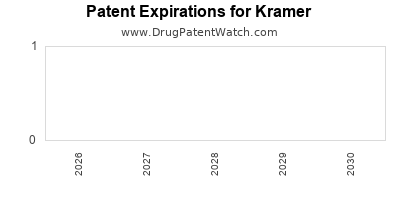Last updated: July 30, 2025
Introduction
Kramer Pharmaceuticals, a distinguished player in the global healthcare sector, commands a significant position through its innovative portfolio and strategic market pursuits. This analysis evaluates Kramer’s market stance, delineates core strengths, and explores strategic pathways for sustained growth amid an evolving pharmaceutical landscape characterized by intense competition, technological innovation, and regulatory complexities.
Market Position and Corporate Overview
Kramer Pharmaceuticals operates within multiple therapeutic domains, including oncology, cardiology, and infectious diseases. Established over two decades ago, the company's global footprint spans North America, Europe, and Asia, with a considerable emphasis on developing markets. The firm's revenue growth CAGR of approximately 7% over the past five years underscores its robust market presence, complemented by a diversified product pipeline and strategic licensing agreements [1].
In the context of top-tier pharmaceutical companies, Kramer is ranked within the top 15, positioning itself as a mid-tier innovator proactively expanding into specialty sectors. Its competitive edge stems from a blend of R&D efficiencies, strategic collaborations, and a focus on unmet medical needs.
Core Strengths
1. Robust R&D Infrastructure
Kramer's significant investment in R&D—averaging 18% of annual revenues—facilitates the development of novel therapies. Its pipeline includes over 20 compounds in different phases of clinical trials, with particular strength in biologic therapeutics and targeted treatments [2]. The integration of advanced technologies such as AI-driven drug discovery further accelerates development timelines and reduces costs.
2. Strategic Partnerships and Licensing
The company's alliances with biotech startups and academic institutions bolster its innovation capacity. Notably, collaborations with university research centers have yielded early access to promising therapeutic candidates. Licensing agreements with larger pharma firms facilitate market entry and expand distribution channels, enhancing Kramer’s reach and revenue streams.
3. Diversified Portfolio
Kramer's diversified portfolio mitigates risks associated with regulatory changes and market fluctuations. Its presence across multiple therapeutic areas cushions against sector-specific downturns and opens avenues for cross-selling and pipeline diversification.
4. Geographic Expansion and Market Access
The company's targeted expansion into Asia and emerging markets capitalizes on demographic shifts and rising healthcare infrastructure. This regional focus enables access to high-growth markets and local partnerships that promote regulatory navigation and market penetration.
5. Regulatory Expertise and Compliance
Kramer's proven track record of navigating complex regulatory landscapes—especially in the US (FDA), European (EMA), and Asian jurisdictions—gives it a competitive advantage. Its proactive regulatory engagement reduces approval timelines and ensures robust compliance, fostering trust with stakeholders.
Strategic Insights and Opportunities
1. Innovation in Personalized Medicine
The rising demand for personalized therapies aligns with Kramer's R&D strengths. Investing further in companion diagnostics and biomarker-driven treatment development can unlock premium pricing, improve efficacy, and cater to niche patient populations.
2. Digital Transformation and Data Analytics
Leveraging digital tools—such as AI, machine learning, and big data analytics—can streamline clinical trials, optimize supply chains, and personalize marketing strategies. Digital innovation enhances operational efficiency and accelerates time-to-market for new products.
3. Mergers and Acquisitions (M&A) Strategy
Kramer's targeted acquisitions of biotech startups and niche therapeutics firms can fill pipeline gaps and diversify its portfolio. Strategic M&A activities should focus on assets with high unmet medical needs and promising clinical profiles, creating rapid value addition.
4. Focus on Specialty and Rare Diseases
Addressing orphan and rare diseases offers higher pricing power, faster regulatory approvals, and less competition. Kramer's expertise in biologics positions it well to develop therapies in this high-margin segment.
5. Emphasis on Sustainability and Corporate Responsibility
Stakeholders increasingly prioritize ESG factors. Integrating sustainability into manufacturing, supply chains, and community engagement enhances corporate reputation and long-term viability.
Competitive Landscape and Challenges
Kramer's standing must be assessed against industry giants such as Pfizer, Novartis, and AstraZeneca, all investing heavily in innovation and M&A. Competitive pressures in biologics, biosimilars, and gene therapies remain intense, with patent cliffs and generic threats looming. Regulatory challenges and market access hurdles in emerging economies necessitate strategic agility.
The rising costs of drug development, coupled with pricing pressures and reimbursement constraints, pose financial risks. Additionally, global geopolitical tensions and supply chain disruptions could impede operational continuity.
Conclusion
Kramer's proactive innovation, strategic collaborations, and regional expansion underpin its resilient market position. By leveraging data-driven approaches, cultivating specialty niches, and maintaining agility in regulatory navigation, it can capitalize on emerging opportunities. Continuous investments in R&D and corporate resilience are vital to sustain its competitive edge amid evolving industry dynamics.
Key Takeaways
- Innovation Focus: Amplify R&D in personalized medicine and biologics to tap into high-margin segments.
- Digital Adoption: Invest in digital transformation to streamline research, production, and commercialization.
- Partnership Strategy: Expand strategic alliances, especially in emerging markets and early-stage biotech collaborations.
- Market Diversification: Strengthen presence in high-growth regions to mitigate geographical and sector-specific risks.
- Sustainability Commitment: Embed ESG principles into core operations to enhance stakeholder trust and regulatory resilience.
FAQs
1. What are Kramer's primary competitive advantages in the pharmaceutical industry?
Kramer's strengths include a state-of-the-art R&D infrastructure, diversified therapeutic portfolio, strategic partnerships, regulatory expertise, and regional expansion strategies that create a resilient market presence.
2. How does Kramer differentiate itself from industry giants?
While industry giants leverage vast resources, Kramer emphasizes agility through innovation, niche targeting like rare diseases, and digital transformation, allowing it to compete effectively in high-growth segments and emerging markets.
3. What are the main risks facing Kramer’s growth trajectory?
Risks include patent expiries, intense competition from biosimilars and generics, regulatory hurdles, market access barriers, and geopolitical uncertainties affecting supply chains.
4. Which strategic initiatives can enhance Kramer's market expansion?
Focusing on personalized medicine, expanding digital capabilities, pursuing targeted M&A, and deepening penetration into emerging markets are key initiatives for sustainable growth.
5. How can Kramer sustain innovation amid rising R&D costs?
By embracing advanced technologies such as AI and machine learning to reduce discovery timelines, forming strategic alliances to share resources, and prioritizing high-potential pipelines, Kramer can maintain a competitive edge.
References
[1] Company Annual Reports and Financial Disclosures, 2022-2023.
[2] Clinical Pipeline Data, Kramer Pharmaceuticals, 2023.

